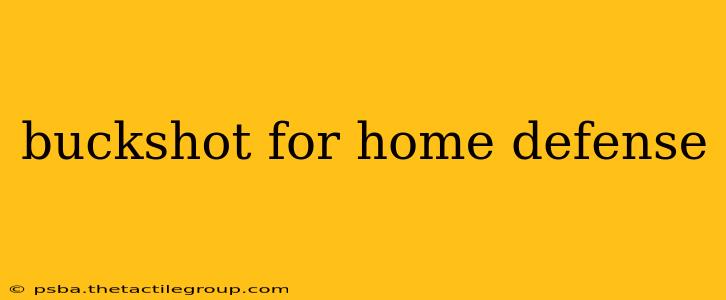Choosing the right ammunition for home defense is a critical decision, impacting the safety of your family and yourself. Buckshot is a popular option, but it's crucial to understand its capabilities and limitations before making a choice. This comprehensive guide will explore the effectiveness, legality, and ethical considerations of using buckshot for home defense.
Understanding Buckshot
Buckshot consists of multiple lead or other metal pellets contained within a shotgun shell. The number of pellets and their size vary, significantly impacting their range and penetration. Common sizes include #00, #000, and #4 buckshot, with #000 being the largest and having the most destructive power at close range.
Advantages of Buckshot for Home Defense:
- Stopping Power: Buckshot's multiple projectiles deliver significantly more energy than a single bullet, increasing the likelihood of stopping a threat quickly. The larger pellets in #00 and #000 buckshot offer exceptional stopping power within effective range.
- Pattern Density at Close Range: Within typical home distances (under 25 yards), buckshot spreads enough to increase the chances of hitting a target, even with less-than-perfect aim. This is a crucial advantage in high-stress situations.
- Availability and Affordability: Buckshot is readily available at most sporting goods stores and gun shops, and it's generally more affordable than other self-defense ammunition.
Disadvantages of Buckshot for Home Defense:
- Overpenetration: This is perhaps the most significant drawback. Buckshot can travel through walls and other obstacles, potentially harming unintended individuals beyond the immediate threat. This risk increases with larger pellet sizes and higher velocities.
- Limited Range: The effectiveness of buckshot decreases dramatically beyond 25 yards. At longer distances, the spread becomes too wide, reducing accuracy and stopping power. This makes it unsuitable for situations outside of a home defense scenario.
- Recoil: Buckshot's substantial recoil can be challenging for some shooters, especially those with less experience. Strong recoil can impact accuracy and control, especially under stress.
- Legal Considerations: Laws regarding the use of firearms, including buckshot, vary significantly by location. It's essential to thoroughly understand your local laws and regulations before using buckshot or any firearm for self-defense. Consult with legal counsel for clarity.
Choosing the Right Buckshot Load for Home Defense
Several factors influence the selection of appropriate buckshot:
- Pellet Size: #00 buckshot offers a good balance between stopping power and overpenetration risk. #000 buckshot delivers more stopping power but poses a greater overpenetration risk. Smaller sizes like #4 buckshot may be less effective at stopping a threat.
- Shell Length: Longer shells (e.g., 3-inch) generally contain more pellets and provide higher velocity. However, this also increases recoil.
- Shot Cup: The shot cup is the plastic or metal casing that holds the pellets together. A good quality shot cup helps maintain the pattern at close range.
Ethical and Legal Considerations
Using lethal force in self-defense requires careful consideration and must always align with the law. The use of buckshot carries a heightened risk of collateral damage, underscoring the importance of responsible gun ownership and the need for proper training in safe firearm handling and self-defense techniques. Before using any firearm for self-defense, seek professional training from a qualified instructor. Familiarize yourself with your local laws and legal ramifications of using deadly force. Understanding the "Castle Doctrine" and "Stand Your Ground" laws, if applicable in your jurisdiction, is crucial.
Conclusion
Buckshot can be an effective home-defense option, but it's not without its drawbacks. The risk of overpenetration must be carefully weighed against its stopping power. Choosing the right ammunition, understanding its limitations, and practicing safe gun handling are paramount. Prioritize comprehensive training and legal counsel to ensure responsible and safe use of any firearm for self-defense. Remember that responsible gun ownership goes beyond simply acquiring a weapon; it's a commitment to safety, legal compliance, and ethical conduct.

